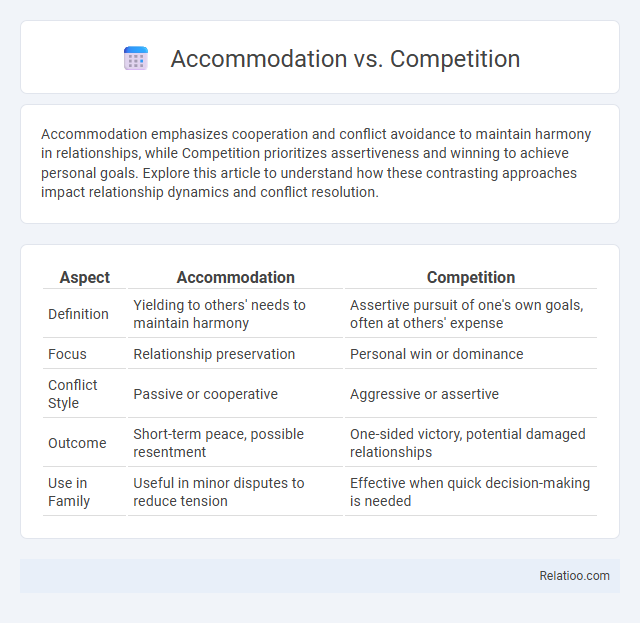Accommodation emphasizes cooperation and conflict avoidance to maintain harmony in relationships, while Competition prioritizes assertiveness and winning to achieve personal goals. Explore this article to understand how these contrasting approaches impact relationship dynamics and conflict resolution.
Table of Comparison
| Aspect | Accommodation | Competition |
|---|---|---|
| Definition | Yielding to others' needs to maintain harmony | Assertive pursuit of one's own goals, often at others' expense |
| Focus | Relationship preservation | Personal win or dominance |
| Conflict Style | Passive or cooperative | Aggressive or assertive |
| Outcome | Short-term peace, possible resentment | One-sided victory, potential damaged relationships |
| Use in Family | Useful in minor disputes to reduce tension | Effective when quick decision-making is needed |
Understanding Accommodation and Competition
Accommodation involves adjusting one's behavior or attitudes to meet the needs or expectations of others, fostering cooperation and harmony in social or organizational settings. Competition, in contrast, emphasizes striving to outperform others to achieve personal or group goals, often driving innovation and performance but potentially leading to conflict. Understanding accommodation and competition is essential for balancing collaboration and rivalry, enabling effective decision-making and relationship management in diverse environments.
Key Differences Between Accommodation and Competition
Accommodation involves cooperative strategies where competing parties make adjustments to reach mutual agreement, whereas competition centers on opposing efforts to achieve a goal at the other's expense. Your choice between accommodation and competition impacts relationship dynamics and outcome efficiency, as accommodation fosters collaboration and competition drives individual success. Understanding key differences such as intent, outcome focus, and conflict resolution methods helps tailor approaches to specific situations for optimal results.
Historical Perspectives on Social Behavior
Accommodation in social behavior refers to the process where individuals or groups adjust their actions to maintain harmony and avoid conflict, often seen in early human societies aiming for group cohesion. Competition, contrastingly, involves individuals or groups striving for resources or dominance, a dynamic frequently observed in both animal behavior and human history that drives social evolution. Your understanding of these concepts highlights how the balance between accommodation and competition has shaped social structures and interpersonal relationships throughout history.
Psychological Foundations of Cooperative and Competitive Traits
Accommodation, Competition, and Cooperation represent key psychological foundations that shape human social interactions and personality traits. Accommodation fosters empathy, trust, and conflict resolution skills, enhancing your ability to build harmonious relationships and promote group cohesion. Competitive traits, driven by social comparison and dominance, activate goal-oriented behaviors and resilience, while cooperative traits encourage prosocial behavior and mutual support, balancing individual achievement with collective well-being.
Benefits of Accommodation in Various Settings
Accommodation in various settings promotes inclusivity by adapting environments to meet diverse needs, enhancing comfort and accessibility for all individuals. Your ability to accommodate different preferences or challenges fosters collaboration and reduces conflicts in both educational and professional contexts. This approach ultimately supports improved well-being and productivity by prioritizing understanding and flexibility over rigid competition or confrontation.
Advantages and Drawbacks of Competitive Dynamics
Competitive dynamics drive innovation by encouraging firms to differentiate products and improve efficiency, which can lead to increased market share and customer loyalty. However, intense competition may result in price wars, reduced profit margins, and increased operational costs. Firms must balance aggressive tactics with sustainable strategies to avoid long-term negative impacts on market stability and business growth.
Real-World Examples: When Accommodation Works Best
Accommodation works best in international relations when conflicting parties share overlapping interests, such as the U.S.-Canada border agreement that resolved territorial disputes peacefully. In business, accommodation strategies are effective in family-owned companies where maintaining long-term relationships outweighs short-term competitive gains, exemplified by successful franchise collaborations like the Marriott and Ritz-Carlton partnership. Diplomatic accommodation is critical in climate change negotiations, where countries like the EU and China compromise on emission targets to achieve collective environmental goals without halting economic progress.
Situations Where Competition Drives Success
In business and ecology, competition drives success by fostering innovation, efficiency, and adaptability when resources are limited or market demands are high. Competitive environments push companies or species to optimize strategies, improve product quality, and reduce costs, resulting in accelerated growth and market leadership. Examples include tech industry rivalry boosting development cycles and natural selection promoting survival of the fittest traits in ecosystems.
Finding a Balance: Integrating Accommodation and Competition
Finding a balance between accommodation and competition involves recognizing when to prioritize collaboration and when to assert one's interests for optimal outcomes. Effective integration requires adaptive strategies that leverage accommodation to build trust and collaboration while using competition to drive innovation and performance. Organizations that harmonize these dynamics can enhance decision-making, foster resilient relationships, and achieve sustainable success.
Future Trends in Social Interaction Approaches
Future trends in social interaction approaches increasingly emphasize accommodation as a strategy to foster inclusive communication and collaboration, leveraging empathy and adaptive behavior in diverse environments. Competition remains relevant in driving motivation and innovation but is often balanced with cooperative elements to create more sustainable and constructive social dynamics. You can expect hybrid models combining accommodation and competitive tactics to dominate, supported by technological advancements that enhance real-time feedback and personalized interaction strategies.

Infographic: Accommodation vs Competition
 relatioo.com
relatioo.com